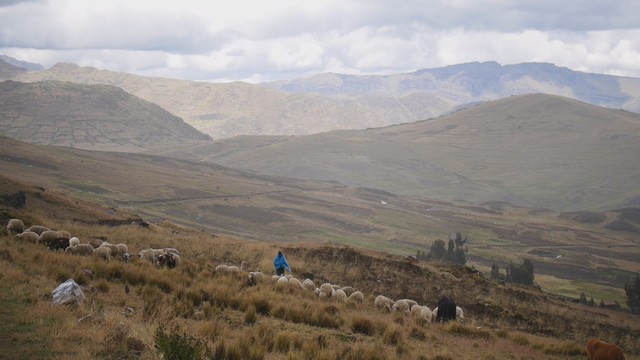Protecting and restoring critical water related ecosystems in mountains: the role of Indigenous Peoples and biocultural territories in mountain ecosystems
IIED and the International Network of Mountain Indigenous Peoples hosted a side event at the UN 2023 Water Conference on 24 March that presented evidence of the climate change impacts facing mountain water-related ecosystems, and the role played by Indigenous Peoples and mountain communities in conserving them.

The Himalayan mountains in Lukla, Nepal (Photo: Sam Hawley, via Flickr, CC BY 2.0)
Mountains provide critical water resources for millions of mountain people and downstream populations, including towns and cities in the global South that rely heavily on mountain watersheds and annual snowmelts.
Indigenous Peoples and traditional mountain communities play a crucial role in protecting water-related ecosystems in mountains, through cultural and spiritual values and customary laws for conservation and sustainable use.
However, mountain ecosystems and Indigenous Peoples and local communities (IP and LCs) experience significant adverse impacts from climate change, with above average warming in mountains leading to rapid melting of glaciers, increased exposure to risk, and reduced and erratic rainfall. At the same time, mountain ecosystems and communities face growing pressures from unsustainable development and environmental degradation.
This side event at the UN 2023 Water Conference presented evidence of the climate change impacts facing mountain water-related ecosystems (such as forests, glaciers, rivers and lakes) and downstream communities, based on global scientific studies and observations by IP and LCs.
It showcased the critical role of mountain IP and LCs and collectively governed traditional landscapes in protecting and enhancing water resources for mountain communities and downstream populations, for example through the protection of sacred sites, forests and grasslands; agroecological practices; drought-tolerant crops; and customary water management systems.
The event was organised by IIED, Asociacion ANDES (Peru), the International Network of Mountain Indigenous Peoples (INMIP), Kenya Forestry Research Institute (KEFRI), the Mountain Partnership secretariat, the national Farmer Seed Network (FSN) China, and the Association of Potato Park Communities.
It presented solutions being implemented through the biocultural heritage territories approach, and included presentations by researchers, the Food and Agriculture Organization of the United Nations (FAO), UN member states and mountain IP and LCs, including women.The UN 2023 Water Conference was co-hosted by Tajikistan and the Netherlands.
Speakers
- Krystyna Swiderska, principal researcher, IIED: the impacts of climate change on mountain water provision, and the role of traditional knowledge and biocultural heritage in enhancing resilience
- Virginie Gillet, FAO: mountain ecosystems as towers of water, and Indigenous Peoples and the Mountain Partnership
- Alejandro Argumedo, Quechua representative, Peru and coordinator of INMIP: the role of Indigenous biocultural territories in water provision and the International Network of Mountain Indigenous Peoples
- Quechua Potato Park experts, Peru: how the Potato Park biocultural territory and Quechua cultural and spiritual values conserve water ecosystem services
Event coverage
Read a report of the event, which was one of the few events at the conference that centred on the knowledge and solutions of Indigenous Peoples in a conference dominated by high-level officials, big corporations and NGOs.
A summary of proceedings by the UNGA president fed into the 2023 session of the UN High-level Political Forum on Sustainable Development, and Indigenous Peoples also called for recognition of their vital role in protecting mountain water towers.
During the conference, INMIP and IIED launched the Water Temples Initiative, a global network of Indigenous biocultural heritage territories, to protect and restore mountain water-related ecosystems.
IIED events newsletter
Sign up to our mailing list for updates and invitations to events throughout the year, including webinars, critical themes and debriefs.
Contact
Krystyna Swiderska, principal researcher, IIED's Natural Resources research group



